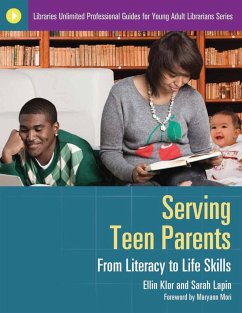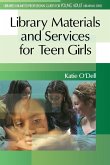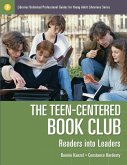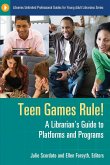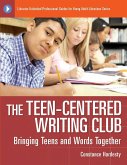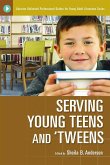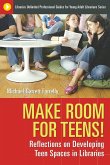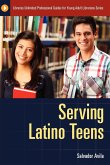- Broschiertes Buch
- Merkliste
- Auf die Merkliste
- Bewerten Bewerten
- Teilen
- Produkt teilen
- Produkterinnerung
- Produkterinnerung
A comprehensive guide to working with teen parents and their children that provides practical program ideas for successful school and public library program development, implementation, and evaluation. Teen parents and their children represent an underserved, high-need population in many communities. Libraries have the potential to significantly influence the quality of life for teen parent families by providing free access to information and resources, developing specific programs, and serving as a safe, public learning environment. Serving Teen Parents: From Literacy to Life Skills helps…mehr
Andere Kunden interessierten sich auch für
![Library Materials and Services for Teen Girls Library Materials and Services for Teen Girls]() Katie O'DellLibrary Materials and Services for Teen Girls63,99 €
Katie O'DellLibrary Materials and Services for Teen Girls63,99 €![The Teen-Centered Book Club The Teen-Centered Book Club]() Bonnie KunzelThe Teen-Centered Book Club55,99 €
Bonnie KunzelThe Teen-Centered Book Club55,99 €![Teen Games Rule! A Librarian's Guide to Platforms and Programs Teen Games Rule! A Librarian's Guide to Platforms and Programs]() Teen Games Rule! A Librarian's Guide to Platforms and Programs56,99 €
Teen Games Rule! A Librarian's Guide to Platforms and Programs56,99 €![The Teen-Centered Writing Club The Teen-Centered Writing Club]() Constance HardestyThe Teen-Centered Writing Club55,99 €
Constance HardestyThe Teen-Centered Writing Club55,99 €![Serving Young Teens and 'Tweens Serving Young Teens and 'Tweens]() Serving Young Teens and 'Tweens55,99 €
Serving Young Teens and 'Tweens55,99 €![Make Room for Teens! Reflections on Developing Teen Spaces in Libraries Make Room for Teens! Reflections on Developing Teen Spaces in Libraries]() Michael FarrellyMake Room for Teens! Reflections on Developing Teen Spaces in Libraries56,99 €
Michael FarrellyMake Room for Teens! Reflections on Developing Teen Spaces in Libraries56,99 €![Serving Latino Teens Serving Latino Teens]() Salvador AvilaServing Latino Teens56,99 €
Salvador AvilaServing Latino Teens56,99 €-
-
-
A comprehensive guide to working with teen parents and their children that provides practical program ideas for successful school and public library program development, implementation, and evaluation. Teen parents and their children represent an underserved, high-need population in many communities. Libraries have the potential to significantly influence the quality of life for teen parent families by providing free access to information and resources, developing specific programs, and serving as a safe, public learning environment. Serving Teen Parents: From Literacy to Life Skills helps library staff support teen parents as their children's first teachers, positively affecting two generations at once. The authors explain how to successfully communicate with this group and build upon their competencies and strengths. They offer best practices, professional anecdotes, and step-by-step direction on connecting with teen parents, collaborating with community partners, locating funding options, and implementing successful programs. This invaluable guide is the most comprehensive resource currently available that directly addresses the needs of librarians serving the teen-parent demographic.
Hinweis: Dieser Artikel kann nur an eine deutsche Lieferadresse ausgeliefert werden.
Hinweis: Dieser Artikel kann nur an eine deutsche Lieferadresse ausgeliefert werden.
Produktdetails
- Produktdetails
- Verlag: Libraries Unlimited
- Seitenzahl: 226
- Erscheinungstermin: 12. September 2011
- Englisch
- Abmessung: 280mm x 216mm x 12mm
- Gewicht: 581g
- ISBN-13: 9781598846935
- ISBN-10: 1598846930
- Artikelnr.: 33464630
- Herstellerkennzeichnung
- Libri GmbH
- Europaallee 1
- 36244 Bad Hersfeld
- gpsr@libri.de
- Verlag: Libraries Unlimited
- Seitenzahl: 226
- Erscheinungstermin: 12. September 2011
- Englisch
- Abmessung: 280mm x 216mm x 12mm
- Gewicht: 581g
- ISBN-13: 9781598846935
- ISBN-10: 1598846930
- Artikelnr.: 33464630
- Herstellerkennzeichnung
- Libri GmbH
- Europaallee 1
- 36244 Bad Hersfeld
- gpsr@libri.de
Ellin Klor, Sarah Nordhausen
Series Foreword Foreword Acknowledgments Introduction-A Critical Need:
Libraries Serving Teen Parents The Scope of the Issue The Human Cost on the
Parent The Human Cost on the Child Economic Costs to Society Why Library
Services? What This Book Offers Conclusion Authors' Note References
Chapter 1-Understanding Teen Parents "What Were You Thinking?" The Teen
Brain in Development "It's All about Me!" Adolescent Egocentrism "Who Am
I?" The Formation of an Identity "I Want to Decide!" Establishing
Independence "Where Are My Friends?" Interacting with Peers Teen
Fathers-the Truly Underserved "How Do I Do This?" Meeting the Demands of
Parenting Conclusion References Chapter 2-Teen Parents within a System:
Influencing Factors The Home Environment Family Dynamics The Surrounding
Neighborhood Homelessness Sexual Abuse Mental Health Concerns Educational
Experiences and Issues Hurdles at School Information and Referral Housing
Health Child Support Child Care Local Community Referrals Conclusion
References Resources Chapter 3-Communicating with Teen Parents Working with
Teen Parents Building Relationships Utilizing a Strengths-based Perspective
Effectively Communicating Information Facilitating a Group Group Dynamics
Room Configuration and the Group Conclusion References Chapter 4-Program
Development of Successful Teen Parent Services Institutional Support and
Issues Addressing Challenges Identifying Potential Client Groups and
Partnerships Local Connections Government Agencies Private Nonprofit
Organizations Transitional Housing Agencies Community Meetings and
Coalition Building Making Contact Alternatives for Smaller Communities
Service and Project Planning Form a Project Team Assess the Needs of the
Teen Parent Group Define the Project Formulate a Plan Determine a Timeline
and Budget for the Project Evaluation A Shorthand Planning Process Program
Frequency, Scheduling, Location, and Attendance Staffing and Staff Training
Staff Competencies Suggestions for In-house Collaborations Staff Attitudes
Funding Fundraising and Grants Grantsmanship Training and Information Types
of Grant Funding Writing a Grant Proposal Advice for Successful Grant
Seeking Program Sustainability Aligning Established Services with Teen
Parent Needs Booktalking Book Discussion Groups Teen Parent Volunteers at
the Library Low-maintenance Teen Parent Services Creating Collections for
Teen Parents Conclusion References Resources Appendix: Field-Tested Teen
Parent Services and Programs Every Child Ready to Read® (ECRR) with
Pregnant/Parenting Teens Teens with Tots Young Moms Club Florence
Crittenton Book Club Teen Parent Baby Lapsit Program at Borrego Springs
Library Project L.I.F.T. (Literacy Involves Families Together) Teen Parent
Outreach Youth Literacy Project (YLP) Appendix: Recommended for Teen Parent
Collections Chapter 5-Parent-Focused Programs: Literacy and Life Skills
Program Planning Template Child Care Preliminary Planning Icebreakers
Program Session Format Informational Content Planning Mainstream Teen
Program Ideas to Consider Program Extras Life Skills Library Use Adult
Literacy Information Literacy Job Searching and Continuing Education
Financial Literacy Health Parenting Using Children's Books as Teaching
Tools Adapting an Existing Curriculum General Parenting Workshops
Conclusion References Resources Appendix Reproducible Library Needs Survey
Sample Library Scavenger Hunt Reproducible "Discover Careers That Fit You"
Reproducible Family Media Questionnaire Chapter 6-The Power of Play: Teen
Parents and the Library Crafts Guidelines and Tips for Craft Projects A
Sampler of Craft Projects Resources for Craft Projects Simple Cooking
Activities Helpful Tips Suggested Recipes Resources for Cooking Activities
Self-Care Exercise Mental Health Leisure Reading Readers' Advisory
Storytelling and Reading Aloud to Teen Parents Books and Toys: Creating
Gifts for Their Children Bookmaking Toys for Play and Storytime Resources
for Toy-Making Activities Conclusion References Resources Chapter
7-Parent-Child Interactive Literacy Programs Early Brain Development Goals
of Teen Parent-Child Interactive Literacy Programs Practices that Promote
Early Learning Making Reading a Part of Every Child's Life Books in the
Home Introducing Teen Parents to Children's Books Modeling Read-Aloud
Methods Communicating Early Learning Concepts Incentives Practicing
One-on-One Reading Group Storytimes What Teen Parents Need to Know about
Storytime Who, Me-Do a Storytime? Storytime Program Development and
Presentation Program Template Bilingual Programs Setting the Scene Reading
Aloud Making the Storytime Come Alive Choosing Appropriate Storytime Books
Songs, Fingerplays, and Movement Activities Puppets, Flannelboards, and
Other Special Effects for Group Storytimes Bells, Scarves, and Shakers
Recorded Music Adapting an Existing Curriculum: Every Child Ready to Read®
Early Literacy/Every Child Ready to Read® Workshop ECRR Concepts to
Highlight Conclusion References Resources Appendix Additional Sample
Storytimes Recommended Books, Flannelboard Stories, and Music Reproducible
Storytime Observation Checklist Reproducible Fingerplay Lists 1-4
Flannelboard Story Pattern: "It's Not that Cold Outside" Flannelboard Story
Pattern: "Yellow Star, Yellow Star" Flannelboard Story Pattern: "The Wheels
on the Bus" Chapter 8-Teen Parent Families: Playing and Learning Together
Milestones of Early Development What about Play? Basic Baby Play Planning
Successful Programs Selecting Activities Introducing Activities Behaviors
to Model Everyday Learning Sensory Experiences Early Thinking and Problem
Solving Nature Walk Simple Nature Activities for Early Learning Interactive
Play Activities from Books and Websites Conclusion References Resources
Appendix Reproducible Nature Walk Checklist Index
Libraries Serving Teen Parents The Scope of the Issue The Human Cost on the
Parent The Human Cost on the Child Economic Costs to Society Why Library
Services? What This Book Offers Conclusion Authors' Note References
Chapter 1-Understanding Teen Parents "What Were You Thinking?" The Teen
Brain in Development "It's All about Me!" Adolescent Egocentrism "Who Am
I?" The Formation of an Identity "I Want to Decide!" Establishing
Independence "Where Are My Friends?" Interacting with Peers Teen
Fathers-the Truly Underserved "How Do I Do This?" Meeting the Demands of
Parenting Conclusion References Chapter 2-Teen Parents within a System:
Influencing Factors The Home Environment Family Dynamics The Surrounding
Neighborhood Homelessness Sexual Abuse Mental Health Concerns Educational
Experiences and Issues Hurdles at School Information and Referral Housing
Health Child Support Child Care Local Community Referrals Conclusion
References Resources Chapter 3-Communicating with Teen Parents Working with
Teen Parents Building Relationships Utilizing a Strengths-based Perspective
Effectively Communicating Information Facilitating a Group Group Dynamics
Room Configuration and the Group Conclusion References Chapter 4-Program
Development of Successful Teen Parent Services Institutional Support and
Issues Addressing Challenges Identifying Potential Client Groups and
Partnerships Local Connections Government Agencies Private Nonprofit
Organizations Transitional Housing Agencies Community Meetings and
Coalition Building Making Contact Alternatives for Smaller Communities
Service and Project Planning Form a Project Team Assess the Needs of the
Teen Parent Group Define the Project Formulate a Plan Determine a Timeline
and Budget for the Project Evaluation A Shorthand Planning Process Program
Frequency, Scheduling, Location, and Attendance Staffing and Staff Training
Staff Competencies Suggestions for In-house Collaborations Staff Attitudes
Funding Fundraising and Grants Grantsmanship Training and Information Types
of Grant Funding Writing a Grant Proposal Advice for Successful Grant
Seeking Program Sustainability Aligning Established Services with Teen
Parent Needs Booktalking Book Discussion Groups Teen Parent Volunteers at
the Library Low-maintenance Teen Parent Services Creating Collections for
Teen Parents Conclusion References Resources Appendix: Field-Tested Teen
Parent Services and Programs Every Child Ready to Read® (ECRR) with
Pregnant/Parenting Teens Teens with Tots Young Moms Club Florence
Crittenton Book Club Teen Parent Baby Lapsit Program at Borrego Springs
Library Project L.I.F.T. (Literacy Involves Families Together) Teen Parent
Outreach Youth Literacy Project (YLP) Appendix: Recommended for Teen Parent
Collections Chapter 5-Parent-Focused Programs: Literacy and Life Skills
Program Planning Template Child Care Preliminary Planning Icebreakers
Program Session Format Informational Content Planning Mainstream Teen
Program Ideas to Consider Program Extras Life Skills Library Use Adult
Literacy Information Literacy Job Searching and Continuing Education
Financial Literacy Health Parenting Using Children's Books as Teaching
Tools Adapting an Existing Curriculum General Parenting Workshops
Conclusion References Resources Appendix Reproducible Library Needs Survey
Sample Library Scavenger Hunt Reproducible "Discover Careers That Fit You"
Reproducible Family Media Questionnaire Chapter 6-The Power of Play: Teen
Parents and the Library Crafts Guidelines and Tips for Craft Projects A
Sampler of Craft Projects Resources for Craft Projects Simple Cooking
Activities Helpful Tips Suggested Recipes Resources for Cooking Activities
Self-Care Exercise Mental Health Leisure Reading Readers' Advisory
Storytelling and Reading Aloud to Teen Parents Books and Toys: Creating
Gifts for Their Children Bookmaking Toys for Play and Storytime Resources
for Toy-Making Activities Conclusion References Resources Chapter
7-Parent-Child Interactive Literacy Programs Early Brain Development Goals
of Teen Parent-Child Interactive Literacy Programs Practices that Promote
Early Learning Making Reading a Part of Every Child's Life Books in the
Home Introducing Teen Parents to Children's Books Modeling Read-Aloud
Methods Communicating Early Learning Concepts Incentives Practicing
One-on-One Reading Group Storytimes What Teen Parents Need to Know about
Storytime Who, Me-Do a Storytime? Storytime Program Development and
Presentation Program Template Bilingual Programs Setting the Scene Reading
Aloud Making the Storytime Come Alive Choosing Appropriate Storytime Books
Songs, Fingerplays, and Movement Activities Puppets, Flannelboards, and
Other Special Effects for Group Storytimes Bells, Scarves, and Shakers
Recorded Music Adapting an Existing Curriculum: Every Child Ready to Read®
Early Literacy/Every Child Ready to Read® Workshop ECRR Concepts to
Highlight Conclusion References Resources Appendix Additional Sample
Storytimes Recommended Books, Flannelboard Stories, and Music Reproducible
Storytime Observation Checklist Reproducible Fingerplay Lists 1-4
Flannelboard Story Pattern: "It's Not that Cold Outside" Flannelboard Story
Pattern: "Yellow Star, Yellow Star" Flannelboard Story Pattern: "The Wheels
on the Bus" Chapter 8-Teen Parent Families: Playing and Learning Together
Milestones of Early Development What about Play? Basic Baby Play Planning
Successful Programs Selecting Activities Introducing Activities Behaviors
to Model Everyday Learning Sensory Experiences Early Thinking and Problem
Solving Nature Walk Simple Nature Activities for Early Learning Interactive
Play Activities from Books and Websites Conclusion References Resources
Appendix Reproducible Nature Walk Checklist Index
Series Foreword Foreword Acknowledgments Introduction-A Critical Need:
Libraries Serving Teen Parents The Scope of the Issue The Human Cost on the
Parent The Human Cost on the Child Economic Costs to Society Why Library
Services? What This Book Offers Conclusion Authors' Note References
Chapter 1-Understanding Teen Parents "What Were You Thinking?" The Teen
Brain in Development "It's All about Me!" Adolescent Egocentrism "Who Am
I?" The Formation of an Identity "I Want to Decide!" Establishing
Independence "Where Are My Friends?" Interacting with Peers Teen
Fathers-the Truly Underserved "How Do I Do This?" Meeting the Demands of
Parenting Conclusion References Chapter 2-Teen Parents within a System:
Influencing Factors The Home Environment Family Dynamics The Surrounding
Neighborhood Homelessness Sexual Abuse Mental Health Concerns Educational
Experiences and Issues Hurdles at School Information and Referral Housing
Health Child Support Child Care Local Community Referrals Conclusion
References Resources Chapter 3-Communicating with Teen Parents Working with
Teen Parents Building Relationships Utilizing a Strengths-based Perspective
Effectively Communicating Information Facilitating a Group Group Dynamics
Room Configuration and the Group Conclusion References Chapter 4-Program
Development of Successful Teen Parent Services Institutional Support and
Issues Addressing Challenges Identifying Potential Client Groups and
Partnerships Local Connections Government Agencies Private Nonprofit
Organizations Transitional Housing Agencies Community Meetings and
Coalition Building Making Contact Alternatives for Smaller Communities
Service and Project Planning Form a Project Team Assess the Needs of the
Teen Parent Group Define the Project Formulate a Plan Determine a Timeline
and Budget for the Project Evaluation A Shorthand Planning Process Program
Frequency, Scheduling, Location, and Attendance Staffing and Staff Training
Staff Competencies Suggestions for In-house Collaborations Staff Attitudes
Funding Fundraising and Grants Grantsmanship Training and Information Types
of Grant Funding Writing a Grant Proposal Advice for Successful Grant
Seeking Program Sustainability Aligning Established Services with Teen
Parent Needs Booktalking Book Discussion Groups Teen Parent Volunteers at
the Library Low-maintenance Teen Parent Services Creating Collections for
Teen Parents Conclusion References Resources Appendix: Field-Tested Teen
Parent Services and Programs Every Child Ready to Read® (ECRR) with
Pregnant/Parenting Teens Teens with Tots Young Moms Club Florence
Crittenton Book Club Teen Parent Baby Lapsit Program at Borrego Springs
Library Project L.I.F.T. (Literacy Involves Families Together) Teen Parent
Outreach Youth Literacy Project (YLP) Appendix: Recommended for Teen Parent
Collections Chapter 5-Parent-Focused Programs: Literacy and Life Skills
Program Planning Template Child Care Preliminary Planning Icebreakers
Program Session Format Informational Content Planning Mainstream Teen
Program Ideas to Consider Program Extras Life Skills Library Use Adult
Literacy Information Literacy Job Searching and Continuing Education
Financial Literacy Health Parenting Using Children's Books as Teaching
Tools Adapting an Existing Curriculum General Parenting Workshops
Conclusion References Resources Appendix Reproducible Library Needs Survey
Sample Library Scavenger Hunt Reproducible "Discover Careers That Fit You"
Reproducible Family Media Questionnaire Chapter 6-The Power of Play: Teen
Parents and the Library Crafts Guidelines and Tips for Craft Projects A
Sampler of Craft Projects Resources for Craft Projects Simple Cooking
Activities Helpful Tips Suggested Recipes Resources for Cooking Activities
Self-Care Exercise Mental Health Leisure Reading Readers' Advisory
Storytelling and Reading Aloud to Teen Parents Books and Toys: Creating
Gifts for Their Children Bookmaking Toys for Play and Storytime Resources
for Toy-Making Activities Conclusion References Resources Chapter
7-Parent-Child Interactive Literacy Programs Early Brain Development Goals
of Teen Parent-Child Interactive Literacy Programs Practices that Promote
Early Learning Making Reading a Part of Every Child's Life Books in the
Home Introducing Teen Parents to Children's Books Modeling Read-Aloud
Methods Communicating Early Learning Concepts Incentives Practicing
One-on-One Reading Group Storytimes What Teen Parents Need to Know about
Storytime Who, Me-Do a Storytime? Storytime Program Development and
Presentation Program Template Bilingual Programs Setting the Scene Reading
Aloud Making the Storytime Come Alive Choosing Appropriate Storytime Books
Songs, Fingerplays, and Movement Activities Puppets, Flannelboards, and
Other Special Effects for Group Storytimes Bells, Scarves, and Shakers
Recorded Music Adapting an Existing Curriculum: Every Child Ready to Read®
Early Literacy/Every Child Ready to Read® Workshop ECRR Concepts to
Highlight Conclusion References Resources Appendix Additional Sample
Storytimes Recommended Books, Flannelboard Stories, and Music Reproducible
Storytime Observation Checklist Reproducible Fingerplay Lists 1-4
Flannelboard Story Pattern: "It's Not that Cold Outside" Flannelboard Story
Pattern: "Yellow Star, Yellow Star" Flannelboard Story Pattern: "The Wheels
on the Bus" Chapter 8-Teen Parent Families: Playing and Learning Together
Milestones of Early Development What about Play? Basic Baby Play Planning
Successful Programs Selecting Activities Introducing Activities Behaviors
to Model Everyday Learning Sensory Experiences Early Thinking and Problem
Solving Nature Walk Simple Nature Activities for Early Learning Interactive
Play Activities from Books and Websites Conclusion References Resources
Appendix Reproducible Nature Walk Checklist Index
Libraries Serving Teen Parents The Scope of the Issue The Human Cost on the
Parent The Human Cost on the Child Economic Costs to Society Why Library
Services? What This Book Offers Conclusion Authors' Note References
Chapter 1-Understanding Teen Parents "What Were You Thinking?" The Teen
Brain in Development "It's All about Me!" Adolescent Egocentrism "Who Am
I?" The Formation of an Identity "I Want to Decide!" Establishing
Independence "Where Are My Friends?" Interacting with Peers Teen
Fathers-the Truly Underserved "How Do I Do This?" Meeting the Demands of
Parenting Conclusion References Chapter 2-Teen Parents within a System:
Influencing Factors The Home Environment Family Dynamics The Surrounding
Neighborhood Homelessness Sexual Abuse Mental Health Concerns Educational
Experiences and Issues Hurdles at School Information and Referral Housing
Health Child Support Child Care Local Community Referrals Conclusion
References Resources Chapter 3-Communicating with Teen Parents Working with
Teen Parents Building Relationships Utilizing a Strengths-based Perspective
Effectively Communicating Information Facilitating a Group Group Dynamics
Room Configuration and the Group Conclusion References Chapter 4-Program
Development of Successful Teen Parent Services Institutional Support and
Issues Addressing Challenges Identifying Potential Client Groups and
Partnerships Local Connections Government Agencies Private Nonprofit
Organizations Transitional Housing Agencies Community Meetings and
Coalition Building Making Contact Alternatives for Smaller Communities
Service and Project Planning Form a Project Team Assess the Needs of the
Teen Parent Group Define the Project Formulate a Plan Determine a Timeline
and Budget for the Project Evaluation A Shorthand Planning Process Program
Frequency, Scheduling, Location, and Attendance Staffing and Staff Training
Staff Competencies Suggestions for In-house Collaborations Staff Attitudes
Funding Fundraising and Grants Grantsmanship Training and Information Types
of Grant Funding Writing a Grant Proposal Advice for Successful Grant
Seeking Program Sustainability Aligning Established Services with Teen
Parent Needs Booktalking Book Discussion Groups Teen Parent Volunteers at
the Library Low-maintenance Teen Parent Services Creating Collections for
Teen Parents Conclusion References Resources Appendix: Field-Tested Teen
Parent Services and Programs Every Child Ready to Read® (ECRR) with
Pregnant/Parenting Teens Teens with Tots Young Moms Club Florence
Crittenton Book Club Teen Parent Baby Lapsit Program at Borrego Springs
Library Project L.I.F.T. (Literacy Involves Families Together) Teen Parent
Outreach Youth Literacy Project (YLP) Appendix: Recommended for Teen Parent
Collections Chapter 5-Parent-Focused Programs: Literacy and Life Skills
Program Planning Template Child Care Preliminary Planning Icebreakers
Program Session Format Informational Content Planning Mainstream Teen
Program Ideas to Consider Program Extras Life Skills Library Use Adult
Literacy Information Literacy Job Searching and Continuing Education
Financial Literacy Health Parenting Using Children's Books as Teaching
Tools Adapting an Existing Curriculum General Parenting Workshops
Conclusion References Resources Appendix Reproducible Library Needs Survey
Sample Library Scavenger Hunt Reproducible "Discover Careers That Fit You"
Reproducible Family Media Questionnaire Chapter 6-The Power of Play: Teen
Parents and the Library Crafts Guidelines and Tips for Craft Projects A
Sampler of Craft Projects Resources for Craft Projects Simple Cooking
Activities Helpful Tips Suggested Recipes Resources for Cooking Activities
Self-Care Exercise Mental Health Leisure Reading Readers' Advisory
Storytelling and Reading Aloud to Teen Parents Books and Toys: Creating
Gifts for Their Children Bookmaking Toys for Play and Storytime Resources
for Toy-Making Activities Conclusion References Resources Chapter
7-Parent-Child Interactive Literacy Programs Early Brain Development Goals
of Teen Parent-Child Interactive Literacy Programs Practices that Promote
Early Learning Making Reading a Part of Every Child's Life Books in the
Home Introducing Teen Parents to Children's Books Modeling Read-Aloud
Methods Communicating Early Learning Concepts Incentives Practicing
One-on-One Reading Group Storytimes What Teen Parents Need to Know about
Storytime Who, Me-Do a Storytime? Storytime Program Development and
Presentation Program Template Bilingual Programs Setting the Scene Reading
Aloud Making the Storytime Come Alive Choosing Appropriate Storytime Books
Songs, Fingerplays, and Movement Activities Puppets, Flannelboards, and
Other Special Effects for Group Storytimes Bells, Scarves, and Shakers
Recorded Music Adapting an Existing Curriculum: Every Child Ready to Read®
Early Literacy/Every Child Ready to Read® Workshop ECRR Concepts to
Highlight Conclusion References Resources Appendix Additional Sample
Storytimes Recommended Books, Flannelboard Stories, and Music Reproducible
Storytime Observation Checklist Reproducible Fingerplay Lists 1-4
Flannelboard Story Pattern: "It's Not that Cold Outside" Flannelboard Story
Pattern: "Yellow Star, Yellow Star" Flannelboard Story Pattern: "The Wheels
on the Bus" Chapter 8-Teen Parent Families: Playing and Learning Together
Milestones of Early Development What about Play? Basic Baby Play Planning
Successful Programs Selecting Activities Introducing Activities Behaviors
to Model Everyday Learning Sensory Experiences Early Thinking and Problem
Solving Nature Walk Simple Nature Activities for Early Learning Interactive
Play Activities from Books and Websites Conclusion References Resources
Appendix Reproducible Nature Walk Checklist Index

